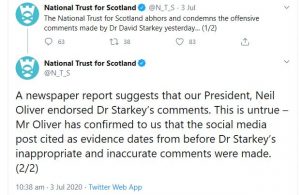
From headtopics.com
I try not to post things on this blog in reaction to every right-wing halfwit who says something stupid in the press or on social media. Otherwise, I’d be stuck at my laptop and furiously writing blog entries 24 hours a day, seven days a week. However, I’ll make an exception in the case of actor Laurence Fox.
As a graduate of Harrow School and a member of the Fox acting dynasty that also includes his father James, uncle Edward and cousins Emilia and Freddie, Laurence Fox is the epitome of the stereotypically posh and well-connected British thespian. He’s also now a darling of the Union Jack-waving, Brexit-loving, Boris-adoring, Trump-admiring, climate change-denying, Black Lives Matter-rejecting, coronavirus-doubting fraternity whose members include such charmers as Toby Young, Douglas Murray and Darren Grimes.
I’ve never seen the TV show Lewis (2006-2015) that made Fox’s name, and in fact prior to 2020 my only sighting of him had been in the 2001 British horror movie The Hole, made when he was in his early twenties and still able to pass for a teenager. The Hole tells the story of how a group of wealthy, spoilt and generally unbearable boarding-school brats, who include Fox, Keira Knightly and Desmond Harrington, skive off a study trip by hacking into their school’s computer and removing their names from the trip-records. Then they steal away to an abandoned underground bunker close to the school grounds, intending to hide there and party for the few days that the trip is in progress. After they descend into the bunker, they discover that they’ve been locked inside, and of course nobody knows they’re trapped there. Thereafter, things go clammily and ickily Lord of the Flies. The hideous youngsters succumb to paranoia and hysteria and eventual, fatal bouts of illness and violence. It turns out that their ordeal was engineered by the sneakily psychotic Thora Birch. Three cheers for Thora, I say.
The Hole contains a memorable moment where Knightly tells Fox to put his ‘cock away’. Recently, noting the controversies Fox has generated, the film critic Kim Newman wondered why nobody had made a gif or sound-clip of this available online.
Early in 2020 Fox made an appearance on the BBC’s politics / panel show Question Time where he exhibited the same qualities that he’d exhibited in The Hole, i.e., he came across as wealthy, spoilt and unbearable. He claimed the UK press’s treatment of Megan Markle wasn’t the result of racism because Britain was ‘the most tolerant, lovely country in Europe’, which will be a surprise to asylum seekers currently being accommodated by Serco and harassed by members of Britain First, and bleated at a person of colour in the Question Time audience who took issue with him that “to call me a white privileged male is to be racist. You’re being racist.”
Now calling Fox ‘white’, ‘male’ and ‘privileged’ – for I’m sure his multiple family connections did nothing to hinder his ascendancy in the acting profession – doesn’t strike me as racist so much as truthful. However, Fox struck a chord with many right-wing malcontents unhappy with prevailing currents of political correctness and wokeness. People who were nostalgic for the good old days when you were allowed to nod along at Enoch Powell, good old Enoch, warning about how rivers would flow with blood if too many ‘wide-grinning picaninnies’ were allowed into Britain, and allowed to chuckle at Bernard Manning, good old Bernard, telling jokes about ‘darkies’ on the telly, admired the cut of Fox’s jib.
Soon he was being hailed as the new messiah of right-wing common sense and telling-it-like-it-is in the pages of the Daily Telegraph, the Spectator and the like. And soon he was popping up here, there and everywhere in the media as a pundit sounding off about the failings of leftie-dominated Britain. (Somehow leftie-dominated despite it having a Conservative government for the last decade.)
The Rupert Murdoch-owned Sunday Times was quick to do a profile of Fox, in which he self-deprecatingly but possibly accurately described himself as ‘a knobbish dickhead half-educated tw*t’. Fox also revealed that he’d fallen out with his brother-in-law who, believe it or not, is the half-Nigerian comedian, actor, writer and filmmaker Richard Ayoade. Apparently, Ayoade said no when Fox asked for his public support after the Question Time appearance caused a furore. Indeed, Ayoade angrily told him, “You have never encountered racism.” To which Fox replied, “Yeah, I have. I’ve encountered racism from black people towards me, when I was working in Kenya for seven months. It’s the way you’re spoken to – racism can be deferential.”
Now I don’t know what ‘deferential racism’ is. Then again, neither does Fox, for when the Sunday Times interviewer asked him to explain what he meant, he said, “I’m just not smart enough to do it.”
Alas, poor Laurence had barely a moment to enjoy his time in the limelight as the new golden boy of all things un-PC and un-woke before he stuck his foot in his mouth. He criticised Sam Mendes’ World War I movie 1917 (2019) for featuring a Sikh soldier as a minor character. This, Fox alleged during a podcast with James Delingpole (who, incidentally, is another right-wing bladder-on-a-stick), was ‘forcing diversity on people’. Fox had to apologise when it was subsequently pointed out to him that some 130,000 Sikhs fought for Britain in World War I.
This week, Fox has been busy apologising again, to actress and comic performer (and his co-star in Lewis) Rebecca Front. Front, a supporter of Black Lives Matter, had had enough of Fox’s constant jabbering that white lives matter too and blocked him on twitter, which Fox claimed was an act of ‘cancellation’. He and Front then had a private text conversation about it, during which Front pointed out: “Black lives are systematically undervalued. Their work opportunities are fewer, their health outcomes far worse, the criminal justice system works against them. I think the least we can do is let them have a f**king slogan.” Afterwards, Fox tweeted a screenshot of their supposedly private conversation, which of course exposed his former co-star to the possibility of pile-ons and trolling by the demented right-wing dingbats who follow him.
No doubt realising that the spat was attracting attention and he wasn’t coming out of it well, he later announced: “…I tweeted a private text message. It isn’t true to my values to make a private conversation public just to make a point. I regret it.”
Self-pity is a major part of Fox’s schtick. He wails that nasty snowflake lefties, like Front, are out to cancel him. He wails that as a well-known, expensively educated, massively well-connected white person he should be getting as much attention as all those disadvantaged, oppressed-for-centuries black folk. And he wails too that his acting work is drying up because most of the showbiz world doesn’t like him for his untrendy views. I would have thought that in 2020, the year of Covid-19, a lot of actors’ work has dried up. Though after the spectacle he’s made of himself recently, would anyone want to spend the entire duration of a film-shoot or the entire run of a theatrical play in his unsufferable presence?
I suppose once upon a time I’d have taken comfort in the fact that the best the intolerant right can do for a figurehead is a bumbling, forever-shooting-himself-in-the-foot idiot like Fox. Surely that would mean they could never constitute a serious threat to society. However, when you look at who’s occupying Number 10 Downing Street, you realise being a grade-A jackass is absolutely no impediment to power these days. God help us. Laurence Fox could have a long and successful political career ahead of him.

© Canal + / Pathe / Buena Vista Distribution




